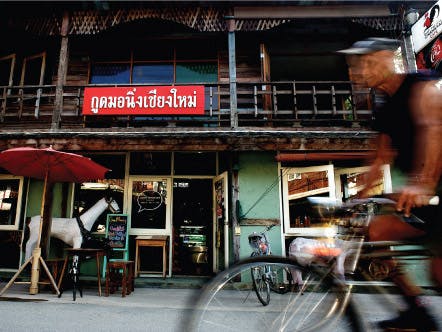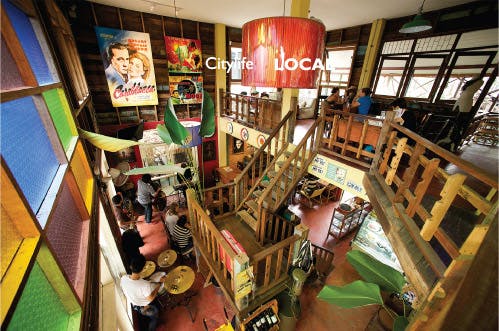Many expats and Thais in Chiang Mai are familiar with the Good Morning Chiang Mai café. Its distinctive trendy-cum-retro atmosphere provides a welcome escape from the ever-increasing hustle and bustle of the old city. Walk in the door and you’re always greeted with a smile and a friendly “Good morning!” as you order up an avocado omelette or a stack of gingerbread pancakes. But perhaps it is the chemistry between owner Yothin Wasuwat and his staff that most stands out. “They’re like friends, not staff,” Yothin says, and indeed, everyone at the restaurant seems genuinely happy to be there.
What most customers don’t know is what’s behind the friendly smiles and jovial greetings, what Yothin has been through and what he continues to go through each and every day.
Three years ago, Yothin and his wife Suwannee had just applied for a business loan to build Good Morning Chiang Mai. Then, one night when Suwannee was away visiting her sister, Yothin woke up with unbearable pain and couldn’t move. After waiting in agony for a number of hours for an ambulance, one finally arrived at eight in the morning and took him to the hospital. There, an MRI was done, and two days later came the news: multiple myeloma, a cancer of the blood. Yothin’s bones were riddled with holes.
Multiple myeloma is incurable. Most patients have symptoms such as bone pain, fatigue, or weight loss before eventually succumbing to the disease. And according to the Multiple Myeloma Research Foundation, “the five-year relative survival rate for multiple myeloma is approximately 41 percent, one of the lowest of all cancers.”
For Yothin, the realities of cancer set in quickly: he commenced seven months of chemotherapy before receiving a stem cell transplant, which caused him to lose all his hair within a week. The transplant cost one million baht and had only a 50/50 chance of success.
Thankfully, Yothin survived the surgery. “It was successful because he didn’t die,” notes Yothin’s wife Suwannee. “They basically took him down close to death and killed off everything in his body in preparation for the transplant. Then they took out the old cells, and one month after collection and treatment to those cells, they were put back into the body as new healthy cells. A lot of people die in the hospital at the time of treatment. There was one case when someone came into one of the other wards with an infection and the patients all died as a result.”
Despite the successful outcome, nothing will change the fact that the cancer is terminal. Nor the daily toll the process took on both Yothin and his family. Follow-up chemotherapy was intense and Yothin struggled with daily pain.
“I would ask him, ‘How are you feeling today?'” recalls Suwannee. “‘Sore,’ was the reply. ‘My back’s sore, I don’t know why.'”

For six months after the transplant, Yothin was put on a strict diet. His family had to ensure his food contained no live bacteria or viruses, meaning everything had to be boiled or come from a can. In addition, he had to take chemotherapy medication as well as 30 steroid tablets every day. All the different drugs were messing with his head.
“I was in a bad mood a lot and didn’t feel like myself,” says Yothin. “I was having a lot of niggling thoughts, like, why is that person looking at me?”
But things improved. Yothin’s condition stabilised and has remained stable for two years since the surgery. Moreover, the cancer has not kept him from pursuing his dreams. He chooses to view his diagnosis as a bump in the road rather than a roadblock, and refuses to stagnate, cancer be damned.
“I make each day a good day and think about my life,” says Yothin. “I try not to think about the future and what will happen.”
Indeed, Yothin has done more in a few short years than many do in a lifetime. In addition to running his restaurant, he is an accomplished painter, graphic designer, architect, interior decorator and musician.
A penchant for creativity and the arts is something that runs in Yothin’s family. As pioneers in the Thai movie industry back in the Golden Age of Thai cinema during the 1920s and 30s, his ancestors produced the first Thai sound film, 1932’s Long Thang (or Gone Astray). Other members of the family teach photography and sell fine art, and the process of creating has become an invaluable form of coping and support for Yothin.

Coincidently, both Yothin and his wife had also dreamed about owning their own guesthouse since they were young. And despite it all, that dream is now being realised with the construction of the Good Morning Chiang Mai Tropical Inn, an 11-room contemporary colonial style guesthouse, designed by Yothin and Suwannee, which is currently being built just behind the restaurant. Construction is expected to be completed by April 2014.
“I think we’re making each other’s dreams come true,” says Suwannee. Already, the two have an impressive vision of the final product, of guests relaxing by the pool and sipping lattes whilst listening to a live jazz band playing in the courtyard.
That’s not to say Yothin and Suwannee don’t have difficult days. They do.
“This week has been really tough on Yo because he has had to work extra hard and extra long,” says Suwannee. “I get tired. I have my own job and a four-year-old to raise. When Yo gets home there’s not much family time. He’s exhausted and sometimes needs to crash. I have to be more understanding. He’s very forgetful at times and has had to learn to write lists for everything, but luckily the doctors warned me about that.”
Acceptance of Yothin’s inevitable, premature end is difficult at best, and the day-to-day realities of cancer weigh on the family. But what they have learned, what they must cling to, is that life is about forward motion. “I just move on, go, go, go. Time is not much, I just keep going,” Yothin says.
For Yothin, cancer has been a wake-up call, and a call to action. It’s a reason to focus right now (procrastination is no longer an option) on not only his goals but also his relationships, including those that might otherwise have been lost along the way. Not long after the diagnosis, Yothin made it a priority to reconnect with old friends, and today he can often be found surrounded by them, smiling, laughing and playing jazz in the lounge area of the restaurant every Saturday morning.
“I don’t think about dying,” Yothin says. “My family helps me get through. I haven’t felt fear in a long time.”

